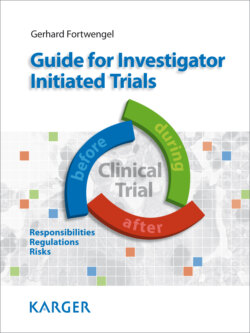Читать книгу Guide for Investigator Initiated Trials - Группа авторов - Страница 11
На сайте Литреса книга снята с продажи.
Оглавление6Financing
Before Initiation
The sponsor-investigator should take heed of these two expressions: ‘no cash, no bash’ and ‘time is money’.
A clinical trial provokes huge costs. If the sponsor or sponsor-investigator does not have enough money for the study, he/she cannot pay for all the required materials, facilities, IMPs, and other study expenses.
In the worst case, the study will not be compliant to the Study Protocol and has to be interrupted or cancelled.
Regulatory Reference
! ICH GCP Guideline, Chapters 5.9, 6.14 and 8.2.4
Responsibilities
There are no specific policies regarding study costs and finances. However, it is highly recommended that special care be taken to ensure there is a signed contract between the sponsor-investigator and the investor(s) about the funding situation as needed. A finance plan must be created and presented in the study protocol.
Advice - Hints and Tips
Before the trial starts, ensure that there are enough financial resources to run the study to its completion, including publication.
All expenses should be calculated with a reasonable tolerance. Bear in mind that a lack of liquidation might have undesirable consequences and impact the study conduct.
Due to the nature of investigative clinical trials, it is strongly recommended to set aside reserves for unforeseeable events and issues to complete the study. Try to estimate all the expenses that can originate during the study; look for budget references in other similar studies in relation to the expenses to get a keen sense of estimating your own study costs and to create your own finance and investment plan.
Many institutions, people, and companies stand to benefit if your study is successful, thus, most investors will be cooperative. In general, a clinical study requires financing for:
• Facilities
• Technical requirements
• Medical products/medical devices
• Personnel
• Patients
• Contracts and approvals
• Insurances
• Documentation and administration
• Unscheduled delays and activities
Possible investors include the pharmaceutical company of your IMP. Quite often, the pharmaceutical company will provide the IMP(s) to you for free. Try to get subsidies from your government or other research institutions or societies.
You may transfer financial tasks to third parties if you do not feel comfortable to manage the financial details of the trial. However, bear in mind the more you outsource, the more you transfer your sponsor-responsibilities to other parties.
Operational Instructions
• The sponsor-investigator should create a detailed finance and investment plan (with the support of the investor, if available).
• The investor and the sponsor-investigator should sign a contract that is based on the finance and investment plan above.
• All financing-related documents should be placed in the Trial Master File (TMF).
During Study
It is often the case that some procedures or objectives related to the clinical trial change during the study. As a consequence, the costs can increase immediately.
What should the sponsor-investigator do if some costs in the finance structure and plan are significantly shifted?
Regulatory Reference
! ICH GCP Guideline, Chapters 5.9, 6.14 and 8.2.4
Responsibilities
Financial liquidation has to be backed by the sponsor-investigator. For this reason, there are no regulatory policies. It is clear that the study cannot be finished if there are not enough resources.
Advice - Hints and Tips
Financial plans should consider any kind of changes during the study. The financial plan and any revisions to it should be checked carefully before changes are implemented. The financial plan should be kept up-to-date at all times by the sponsor-investigator in order to ‘hold the purse strings’ and to manage the budget. In case of financial issues, try to find new/further financial sources as soon as possible. Try to overcome such challenges or unforeseeable huge costs by renegotiating with your investor.
Retain the receipts for all expenses made in the study. It makes sense to compare your estimated costs with your effective costs. This will be a good indicator whether you need to save on non-essential expenses or you have residual money.
If a patient is harmed, the insurance company of your study may also provide financial compensation.
see 12
Insurance
Operational Instructions
You should:
• Create a consolidated financial statement to show all the costs originated during the clinical trial (periodically, if possible)
• Put all additional financial documents, receipts or cost-related material in the TMF
• Make receipts for all disbursements, obtain signatures for the receipt of disbursements from the beneficiary, and get receipts for all expenses
